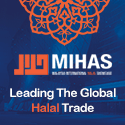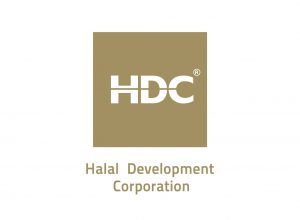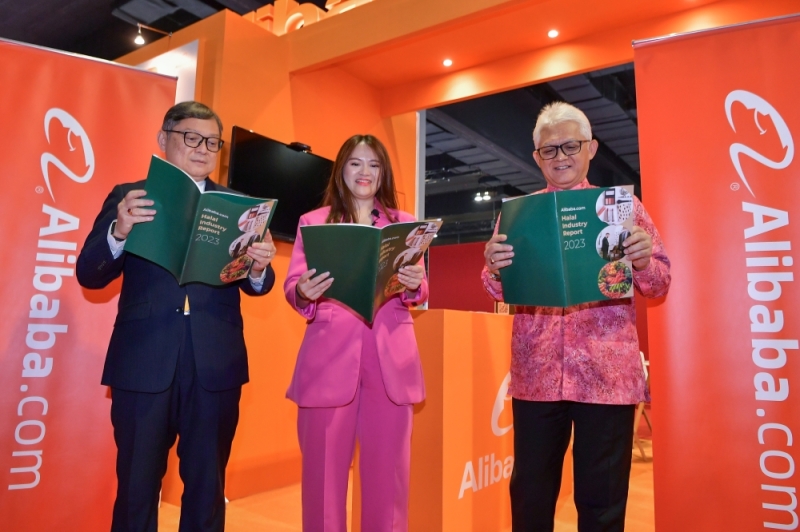 KUALA LUMPUR: Dubbed as the world’s largest halal trade expo, the 15th edition of the Malaysia International Halal Showcase (MIHAS), to be held here this April 4 to 7, is expected to draw global attention.
KUALA LUMPUR: Dubbed as the world’s largest halal trade expo, the 15th edition of the Malaysia International Halal Showcase (MIHAS), to be held here this April 4 to 7, is expected to draw global attention.
First held in 2004 as a halal consumer fair featuring halal products, MIHAS has evolved into a much- anticipated annual specialised trade event on the halal industry worldwide and has elevated Malaysia as the global hub for the Islamic economy.
Attracting the participation of over 1,000 exhibitors from more than 40 countries this year, MIHAS which will be held at the Malaysia International Trade and Exhibition Centre (MITEC), is the most talked-about halal trade expo in the world, making it the cornerstone for the global halal trade.
In 2017, MIHAS had gathered 576 exhibitors from 33 countries, with China, Indonesia, Thailand, Taiwan and the Philippines having the highest number of exhibitors. The contribution in total trade value for last year was RM1.1 billion.
According to Malaysia External Trade Development Corporation’s (MATRADE) director of the Halal, F&B and Agro-Based Section, Mohammad Aminuddin Sham Tajudin, MIHAS’ reputation and credibility had enhanced the country’s halal branding, making it significantly easier for locally produced halal products and services to penetrate the international market.
“As the premier platform for trade in halal products, traders from all over the world leverage on MIHAS to source for such products and services.
“Hence, we tailor our trade theme, programme and approach to ensure MIHAS meets international standards and expectations, and that Malaysia remains relevant as the global hub for the halal industry,” he told Bernama in an exclusive interview.
Through its network of 46 offices worldwide, MATRADE actively seeks out potential trade buyers and get them to participate in the International Sourcing Programme (INSP), which is one of the main attractions at MIHAS.
The Geneva-based International Trade Report (ITC), in its 2015 publication, commended MIHAS for its INSP initiative in bringing together international buyers and local sellers to the table, he said.
“We fly in buyers from all over the world and match them with the Malaysian companies across sectors.
“They keep coming back each year to source for more options and opportunities within the MIHAS cluster,” Aminuddin said, adding that some 4,400 Stock Keeping Units (SKUs) were sold during MIHAS 2017, which was a 17% increase over the previous year’s fair.
The SKU is the alphanumeric identification code of a particular product that allows it to be tracked for inventory purposes.
Malaysia is widely acknowledged as the pioneer in the world’s halal industry.
Supported by its Islamic Finance and Halal Food ecosystem, Malaysia has once again been ranked the number one Islamic economy, according to the Global Islamic Economy Report (GIEI) 2017/2018 produced by Thomson Reuters, the world-renowned research company.
In the GIEI report that measures the overall development of the Global Islamic economy sectors, Malaysia topped the rank with GIEI score of 121, followed by United Arab Emirates (86), Bahrain (66) and Saudi Arabia (63).
This recognition, coupled with the joint efforts of government agencies such as the Malaysia Islamic Development Department (Jakim), Department of Standards Malaysia and Halal Industry Development Corporation (HDC) in promoting the adoption of Malaysia’s halal logo issued by Jakim have helped boost the marketability of halal products and services from Malaysia.
“The Jakim halal logo is the go-to reference for Shariah-compliance certification, standards, accreditation, and research and development, such that non-Muslim majority countries like Thailand, Japan and South Korea, and in Latin America are now seeking Malaysia’s expertise in the halal industry and capitalising on MIHAS as a platform to grow the halal segment in their respective markets,” Aminuddin said.
According to HDC, some 1,400 Malaysian companies generated RM42.2 billion in export earnings in 2016 for halal products ranging from food & beverages, ingredients, cosmetics and pharmaceuticals.
This accounted for 7.5% of the country’s gross domestic product for that year.
There is no doubting that the halal industry players in Malaysia will be looking forward to MIHAS 2018, which will highlight new segments, including an Islamic Trade Finance showcase and forum in which financial institutions will display their Islamic trade finance products such as export financing, import financing, letter of credit and bank guarantee and shipping guarantee.
The Institute of Halal Management and Science@FBM Universiti Teknologi Mara (iHALALMAS) will hold a colloquium where researchers from local and international universities will present their findings on developments in the halal sphere.
In the halal innovation pitching programme, local halal players will present their innovation to selected potential buyers and investors in the process of commercialising their products to both domestic and international markets.
Alongside these new segments, MIHAS will continue to feature its existing components which include the hosted buyer programme, trade talk, industry zone and MIHAS Connect as knowledge-sharing activities and to facilitate trade during the show.
“The annual MIHAS trade exposition is a stamp of Malaysia’s leading role in spearheading the advancement of the halal industry worldwide,” Aminuddin said, while noting that the halal export itself had contributed 5.4% of Malaysia’s overall export in 2016.
The major halal product exports included food & beverages (RM18.6 billion), halal ingredients (RM12.8 billion), palm oil derivatives (RM6.3 billion), cosmetics & personal care (RM2.2 billion), industrial chemicals (RM1.7 billion) and pharmaceuticals (RM0.7 billion). — Bernama



